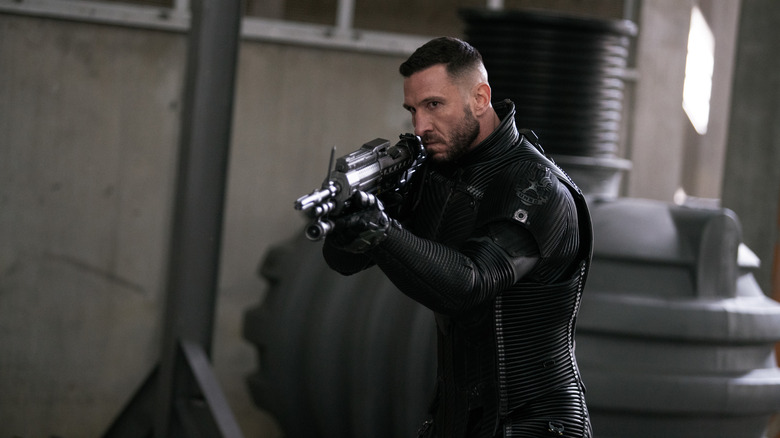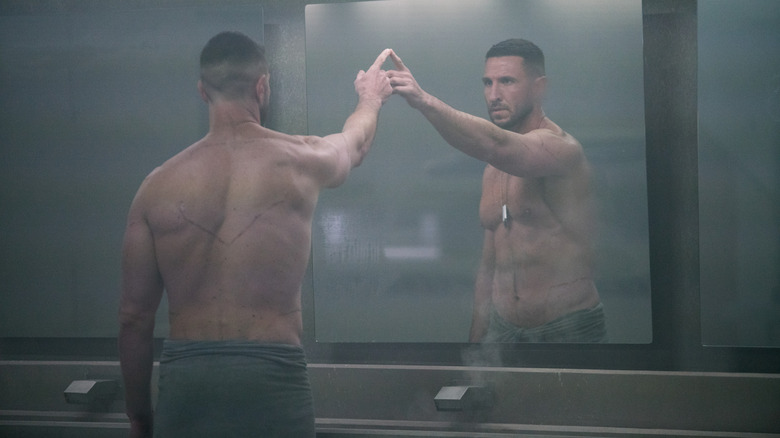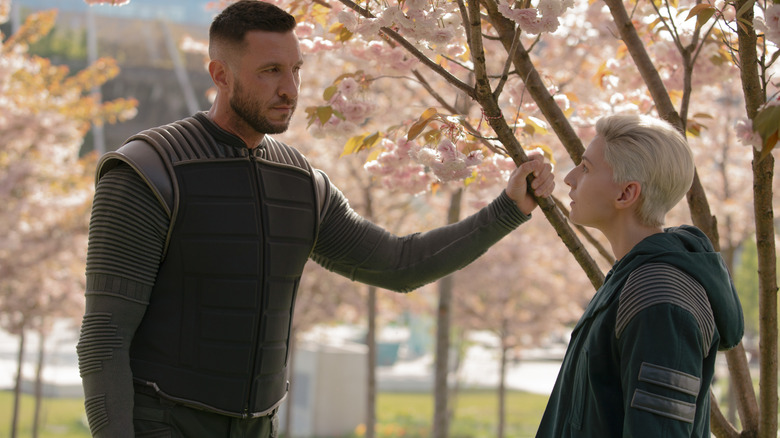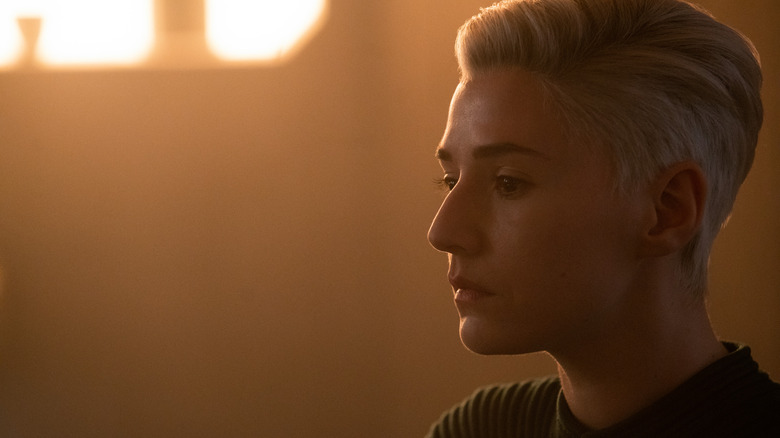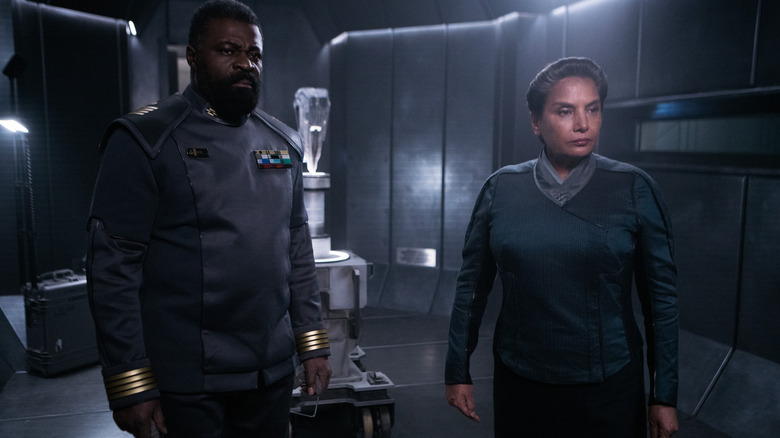Halo Episode 8: Allegiances Are Forged And Shattered As Halo Finally Hits Its Stride
Here's a question I've kept in mind throughout every episode of "Halo" so far: how long are audiences expected to stick it out with a new series, wallowing through uneven results in the early going while waiting for the story to become appointment television? In an ideal world, most shows would be as immediately arresting as "Breaking Bad" or "Lost," dropping viewers headfirst into an unfamiliar story and never letting up, all but daring us to even think about losing interest. The issue of how much slack a show deserves has never felt more pressing, especially given the sheer amount of movies and shows fighting for our attention at any given moment. I've tried to keep this concern in mind throughout every episode recap of "Halo," which has felt like a parade of mixed bags since the opening moments of the premiere.
So when I throw out a statement about how "Halo" has finally hit its stride at such a late stage in the season — the penultimate episode, no less — that's meant to be interpreted with a certain amount of implied criticism, right alongside the deserved praise for (mostly) coming through when it counted most.
This latest episode, titled "Allegiance," lived up to its name and then some. After last week ground all semblance of momentum to a screeching halt for a disconnected and frankly boring check-in on the show's least successful subplot, episode 8 picked up where episode 6 left off. It's hard for me to unequivocally claim that this hour makes the plodding and unconventional path to reach this point completely worth it ... but it'd be just as silly to deny the thrill of seeing all the plates left spinning in the air throughout previous episodes come crashing down here.
Presumably, those still on board with this idiosyncratic show have long since come to terms with the fact that the creative team is simply taking their own unique path to the events of "Combat Evolved." While previous episodes have provided their fair share of entertaining moments, "Allegiance" is perhaps the most significant proof that "Halo" can ultimately live up to its potential — not by reverting to the safe harbor of video game iconography, but by succeeding on its own merits altogether. Let's get right to it.
Arc of the Covenant
There are a few telltale indications early on in "Allegiance" that the episode might steer clear of the pitfalls that previous hours have stumbled headlong into. First, we pick up right where we left off 2 weeks ago; no clunky flashbacks used as a crutch to give the present storyline a needed jolt, thankfully. Secondly (and I acknowledge this is perhaps a low bar to clear), we get a neat bit of visual shorthand further linking John's mystical connection with Makee, the "Blessed One" sent by the Covenant to infiltrate the UNSC and recover the artifact for their own nefarious purposes. With both individuals still reeling from their shared vision of stepping foot onto Halo, John stares at a mirror and feels strangely compelled to draw a certain round-shaped glyph. Cue the smash cut to Makee, alone in her room yet similarly framed by the curves of the circular mirror she's peering into. Parallels, folks!
Nobody's reinventing the wheel of visual storytelling here. But even this small and effective moment, conveyed through means other than dialogue for a change, helps lend a sense of confidence that the script (credited to writers Justine Juel Gillmer and Steven Kane) and the direction (Jonathan Liebesman, who also helmed episodes 5 and 6) are both working together towards a common goal.
That goal, as it happens, deals with the growing complications between John and Makee. The episode takes great pains to quickly establish a sense of intimacy, lingering on the touch of an outstretched hand or John's reassuring invitation of "Don't be afraid" as he leads her away from the busy UNSC headquarters so they can actually talk about what they've both experienced. Of course, they can't get far without being observed secretly by Dr. Halsey (still under house arrest after her falling-out with Admiral Parangosky), who vaguely remarks that John "is connected to something beyond all of us" and that the key lies with the artifact — which has mysteriously cured the Chief of his previous poor health.
When they do get to talk, however, we finally learn a little more about how the Halo fits into a Covenant-held prophecy that Makee believes in, as well. As she tells it, a "divine wind will rush through, propelling all those who are worthy on a great journey to the sacred ring, where we will become like gods." And when John asks about those deemed unworthy (meaning humanity), Makee blithely replies that they will be "cleansed."
Philosophical differences
In another improvement from prior "Halo" episodes, it takes little time at all for "Allegiance" to lay the groundwork to unite all of its disparate threads and coalesce around a single idea. The title hints at the predominant concern of the hour, which neatly explains the focus on the (admittedly rushed) John/Makee development. Both of them very clearly struggle with opposing viewpoints of humanity. Makee, having been exposed to the worst that people have to offer (previously seen flashbacks to her hellish childhood come back to inform much of her story here), actually begins to have an understandable motivation to side with the Covenant over her own kind. John, meanwhile, views his own fragments of a happy childhood as a reason to hold onto humanity's innate capacity for goodness and hope and love, all of which he claims is "within us. Something special, something sacred, something worth protecting."
Despite these early warning signs of trouble to come, John forges ahead anyway — thanks to a mix of euphoria and naïveté over his newfound emotions breaking through his rigid indoctrination, some inexplicable side-effects of contact with the artifact, and perhaps a few narrative shortcuts — and ends up in Makee's quarters, on the pretext of gifting her a book (similar to the one she and her friend read as children) and filling her in on the plan to allow her to communicate through the Madrigal artifact to locate the other artifact on the Covenant planet of Raas Kkhotskha. They end up sleeping with each other after his declaration of trust in her, providing a perfect opportunity for Makee to eliminate the Chief with her energy sword finger implant. Despite some tension, we instead get some nifty body horror when she removes the digit entirely to rid herself of the weapon.
At this point, allegiances are fracturing and reforming across the entire supporting cast. Captain Keyes reassures Parangosky about the danger of John discovering the truth of their involvement in his childhood abduction. Meanwhile, Dr. Halsey continues to scheme and cause certain alarm bells to go off within Cortana. When Keyes visits her one last time to say goodbye before the good doctor is shipped off-planet, her estranged lover explodes in anger at the lengths Halsey is willing to go and the sacrifices she's willing to make to see her own ends achieved. While all this is going on, Miranda Keyes continues to work on translating intercepted Covenant messages, which we know will bring her to the truth of Makee's deception.
Collision course
With all these seeds planted throughout the episode, the climax is effectively set up to bring everything crashing down on top of our main characters. Having stolen her daughter Miranda's biometrics during her last visit 2 episodes ago, Halsey uses this clearance to contact Makee and set the wheels in motion for her escape. Bringing the focus of the episode right back to whether humanity is truly worth saving, Halsey aligns herself with Makee's worldview. "I love humanity," Halsey explains, "but humans are the problem." Worried that the UNSC will only use Halo to destroy themselves, Halsey pressures her into convincing John to take the artifact, make their escape together, and somehow take control of the ringworld themselves. When this desperate plea falls on deaf ears, Halsey resorts to sneering about how attachment and sentimentality lead to feelings of pride, fear, and even love (as a quietly disturbed Cortana suggests), all of which overrule pure, cold logic in normal human beings and force Halsey to step up to "save them from themselves."
All the various dominoes begin to fall when Halsey uses the ace up her sleeve, activating the combat-ready Spartans under her sole authority and planning to use Cortana as a failsafe to get the Chief under control and the artifact into her own hands. Kai, freed from the hormone-suppressing pellet several episodes ago, balks at Halsey's orders to turn against John and receives a swift knockout punch from Riz and Vannak for her trouble. Bothered by some of Halsey's subtle jabs during their conversation and preoccupied with her own religious faith in the Halo, Makee questions John about what he intends to do with the ring if they're eventually able to use it as a weapon to end the war with the Covenant. ("I guess we'll see," he alludes.) And when Halsey finally admits to Cortana that she'll no longer need John's services when she has the artifact, promising that the artificial intelligence will be "free to assume full control of his body and consciousness," it's apparent that even Cortana will have a tough choice to make concerning her own loyalties.
As tortured as the journey has been to get to this point, it's a relief to finally have a sense of genuine exhilaration and momentum as all these storylines come to a head in the last half of the episode simultaneously. Cortana emphatically makes her choice, alerting John to the trap that Vannak and Riz set for him and assisting him during their hand-to-hand combat. Miranda decodes the Sangheili communications and realizes from Makee's chillingly familiar voice that she's a double agent, rushing off to inform Parangosky and her father Captain Keyes. By the time this explosive reveal causes Parangosky and her trigger-happy Marines to brutally arrest Makee, drawing direct parallels to her treatment as a child at the hands of similarly oppressive soldiers, we can practically see her draw her final conclusions about the human race.
Her desperate attempt to grab the artifact at the center of the room causes another surge of energy, briefly incapacitating her enemies and sending her and John to another vision on Halo. Where before there was at least a chance for connection and understanding, her painfully simple "Goodbye, John" seals the deal and sets her up as the main villain for the concluding episode — and perhaps beyond.
(Re)claim to fame
- Halo Watch: We're definitely trending in the right direction! We get this out of the way pretty quickly in the episode when John confronts Makee in the gardens of Reach about how they actually stepped foot (well, as much as shared dreamscapes count) on the Halo ring. As feared from the beginning, it sure seems like we're only actually going to get there in next week's finale ... and even then, it's likely that the Chief's arrival (along with whoever else the show decides to bring along, as clearly the series will boast a vastly different roster of characters than "Combat Evolved" did) and any further explorations of the world will be left as a cliffhanger.
- Mea Culpa: Look, it's likely that nobody else except me would've ever even noticed this. But in the interests of transparency, I have to admit my own mistake. I previously griped about how the series was taking a slightly different tack with the Master Chief's abilities in comparison with other Spartans, making him seem like the best and brightest out of them all. I even went so far as to cite the novel "The Fall of Reach" as my preferred approach. Well, episode 8 came along and made me look foolish. While watching the Chief from her window hundreds of feet above, Halsey directly quotes that book when she observes, "From the moment I first saw him as a child, I had an instinct. He wasn't the fastest or the strongest, but there was something about him." That's the Chief I'm familiar with from the novels, who gets ahead through sheer strength of will and a healthy dose of luck, and I hope next season has the time to explore that further.
- The Great Journey: Makee's recitation of the Covenant prophecy regarding Halo, describing a "Divine wind" and referencing the "Great Journey," is also a direct quote of the Prophet of Mercy from the games. As disappointed as I am that the series never really used Makee's wholly original character to dive into the details of the Covenant religion, I wouldn't be surprised if we get much more of that moving forward.
- Criterion Collection: This is a very minor tidbit since the episode itself glosses over this development rather quickly, but we get a glimpse of the UNSC planet Criterion getting "glassed" by Covenant forces, killing 11 million innocents. This spurs the Master Chief to "take the fight to them" and move forward with his plan to use Makee to find where the Covenant are hiding the second artifact that they recovered. Criterion is taken straight from franchise lore, which is neat, but this one scene only makes me wish we saw more of the galaxy-wide scale of the actual war instead of brief skirmishes here and there.
- Natascha McElhone, Y'all: Last week was Burn Gorman's turn in the actor spotlight, so this week I'm taking Natascha McElhone. She's not going anywhere, mind you, but it's time we fully appreciated her commitment to bringing every ounce of energy needed in every one of her scenes. In her argument with Captain Keyes, her hilariously exasperated eye-roll when he begins waxing poetic about the sanctity of life is only one-upped when she spits out an outraged exclamation of, "My secrets? OUR secrets" when Keyes attempts to shift blame onto her. McElhone's performance goes much deeper than just these two obvious moments, adding so many layers to what's admittedly a thinly-sketched jumble of villainous ideas and one hell of a god complex. Still, that's the power of committed acting, baby.
